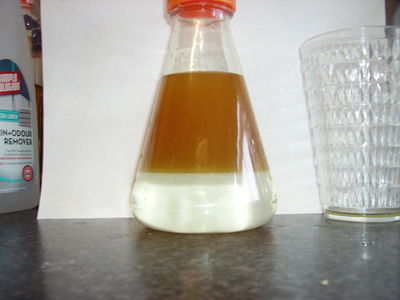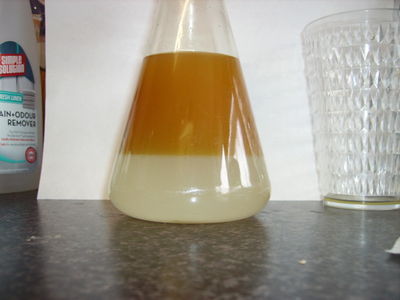Using acetone to aid soap removal
Use the code above if you are working on the page. Delete it when the page is finished and complete. Delete this text once you have read it.
Brief intro, which can include a thumbnail photo, here ...
The TOC tag creates a content box. The text it contains is generated automatically based on the page headings. Delete this text once you have read it.
Introduction.
The use of acetone to aid soap removal in water washing was something that was first discust by Naithen and Steve on this forum, testing has been done by Mark.
First test.
The initial test was done with a 250ml sample. this had already been water washed and had a soap content of 76ppm. It showed a clear 50/50
4 drops of acetone was added, the test was then shacken and left to settle.
It clearly shows more soap has dropped.
Soap content now tested at 36ppm
Method.
As yet this has only been tested in conjunction with the titrated acid, pump wash method.
After the acid wash is drained, add 1ml of acetone to every 10L of bio in to 15% (of batch volume) water.
add this to the bio and pump for 1 hour,
Turn pump off and let the water settle, this normally take a few hours to obtain a good split of bio and water.
At this stage, after just one wash (remember the acid wash is just for nutralisation, not soap removal) do a 50/50 soap test, if like me you find that this gives a clear pass (water at the bottom is clear and you have a good split of bio/water) you may wish to to a titrated soap test.
I have done a titrated soap test and got a result of 42.56ppm of soap.
I would normally need to do at least 3 washes to get soaps down to this level.
I see no advers effects of adding acetone to the bio as it's quite a common practice to do this to aid combution.

